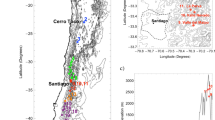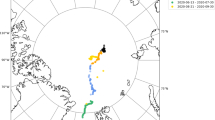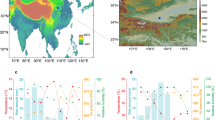Abstract
THE relative abundance of oxygen isotopes in atmospheric precipitation being closely related to temperature, it has been suggested that the variations of the ratio oxygen-18/oxygen-16 in snow should be used in glaciological studies of polar regions1,2. It has been recently announced that very promising results have been already obtained by analysing cores of old ice from deep bore holes in Greenland3.
This is a preview of subscription content, access via your institution
Access options
Subscribe to this journal
Receive 51 print issues and online access
$199.00 per year
only $3.90 per issue
Buy this article
- Purchase on Springer Link
- Instant access to full article PDF
Prices may be subject to local taxes which are calculated during checkout
Similar content being viewed by others
References
Dansgaard, W., Tellus, 5, 461 (1953); Geochim. et Cosmochim Acta., 6, 241 (1954).
Epstein, S., “Nuclear Processes in Geologic Settings”, Pub. 400, U.S. Nat. Acad. Sci. (1957).
Epstein, S., I.G.Y. Bull., No. 21 (1959).
Epstein, S., and Mayeda, T., Geochim. et Cosmochim. Acta, 4, 213 (1953).
Craig, H., Geochim. et Cosmochim. Acta, 12, 133 (1957).
Author information
Authors and Affiliations
Rights and permissions
About this article
Cite this article
GONFIANTINI, R., PICCIOTTO, E. Oxygen Isotope Variations in Antarctic Snow Samples. Nature 184, 1557–1558 (1959). https://doi.org/10.1038/1841557a0
Issue Date:
DOI: https://doi.org/10.1038/1841557a0
This article is cited by
-
Factors controlling oxygen isotopic composition of fallen snow in Antarctica
Nature (1978)
-
Geographical Variations of Oxygen-18/Oxygen-16 Ratio in Surface Snow and Ice from Queen Maud Land, Antarctica
Nature (1963)
-
Isotopic Composition and Temperature of Formation of Antarctic Snows
Nature (1960)
-
Uno spettrometro di massa di elevata sensibilità
Il Nuovo Cimento (1960)
Comments
By submitting a comment you agree to abide by our Terms and Community Guidelines. If you find something abusive or that does not comply with our terms or guidelines please flag it as inappropriate.



